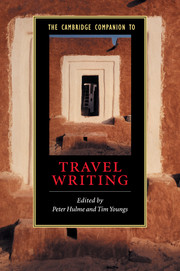15 - Travel writing and its theory
from Part 3 - Topics
Published online by Cambridge University Press: 28 May 2006
Summary
Introduction
'Travel literature' is the significantly generic descriptor that has succeeded the Modern Language Association Bibliography's pre-1980s 'travel, treatment of'. But as a tool it cannot complete a search for relevant critical and theoretical materials. Very early in the contemporary resurgence of interest in travel writing, relations with the analysis of ethnography, thus with the history and function (and future) of anthropology in the West, and with postcolonial theory generally, became vital and generative. The interest in travel writing - across a wide political spectrum - was part of the necessary reimagining of the world first occasioned by the post-World War Two resistance movements and wars of liberation in the former European colonies, as well as by the waves of immigration that followed. It is a vivid shock to walk into the room-sized stained glass globe of the world (1935) suspended in the Mother Church of the Christian Scientists in Boston. Not only because, with loud metaphorical resonance, you can hear the whispers of people on the far side of the glass world as if they were speaking in your own ear, but also because the various pieces, each a different jewelled colour, belong to a world on the point of explosion. Much of the work of observing, interpreting, articulating the explosion of that world, as well as the historical development of the imperialised world that led to it, was done through recovery and analysis of people’s writings about ‘foreign’ and especially ‘exotic’ places in which they had travelled and lived: as colonial masters, pilgrims, explorers, ambassadors, ambivalent wives, roving soldiers, ecstatic cross-dressers, conquistadores, missionaries, merchants, escaped slaves, idle students of the gentry and aristocracy, ‘adventurers’, and alienated modern artists.
- Type
- Chapter
- Information
- The Cambridge Companion to Travel Writing , pp. 261 - 278Publisher: Cambridge University PressPrint publication year: 2002
- 19
- Cited by



